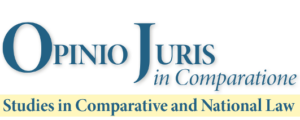CONSTRUCTING A LEGAL CULTURE FOR THE GLOBAL AGE: A Machiavellian and Ramist approach
Authors: Joseph P. Garske⃰
ABSTRACT
In a time of twenty-first century technological advance and globalization, the events of what historians call The Renaissance and The Reformation seem distantly in the past, no longer relevant. It is easy to forget, however, that the fifteenth and sixteenth centuries were also a time of world exploration and technological transformation; sometimes called the first globalization.
Like the world of the twenty-first century, the fifteenth and sixteenth centuries were a time when new methods of law converged with new aggregations of wealth to establish new and more expansive mechanisms of governance. Perhaps most of all, it was a time when human experience began a transition in learning, and finally, to a fixed structuring of what is called the modern mind.
These changes that took place in a confined geographic region of the historic past now include all regions and all peoples of the Earth. The twenty-first century is also an age of concentrated wealth, an expanding atmosphere of law, and a time when the mind of a global public is being redirected from a modern to a postmodern way of understanding.
The purpose of this paper is to show historic parallels in a way that might provide useful insight for the present-day global project. The emphasis will be on two pivotal figures, Niccolo Machiavelli and Pierre de La Ramee, and how they came to provide an ethic and a mode of thought that would shape governing relations between the praestantae, the elite, and the popolo minuto, the common people.
Keywords: Machiavelli – Ramus – Politics – Law - Knowledge

